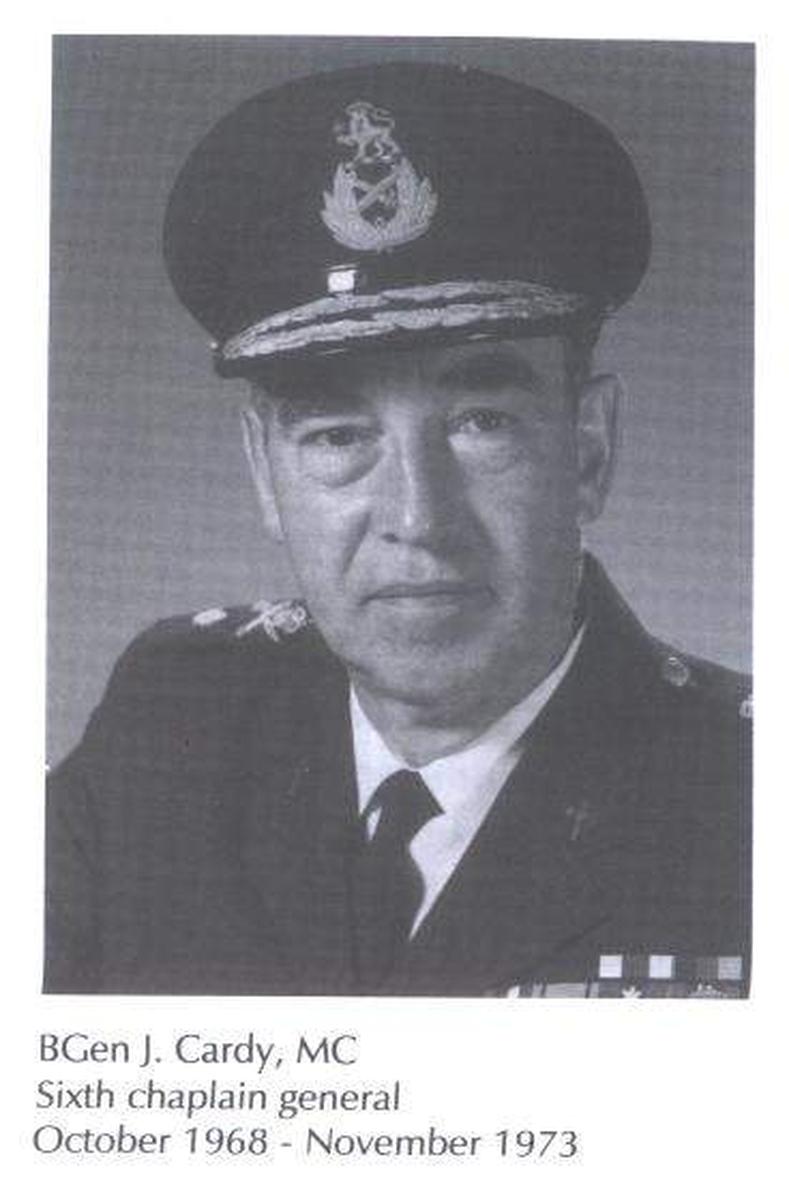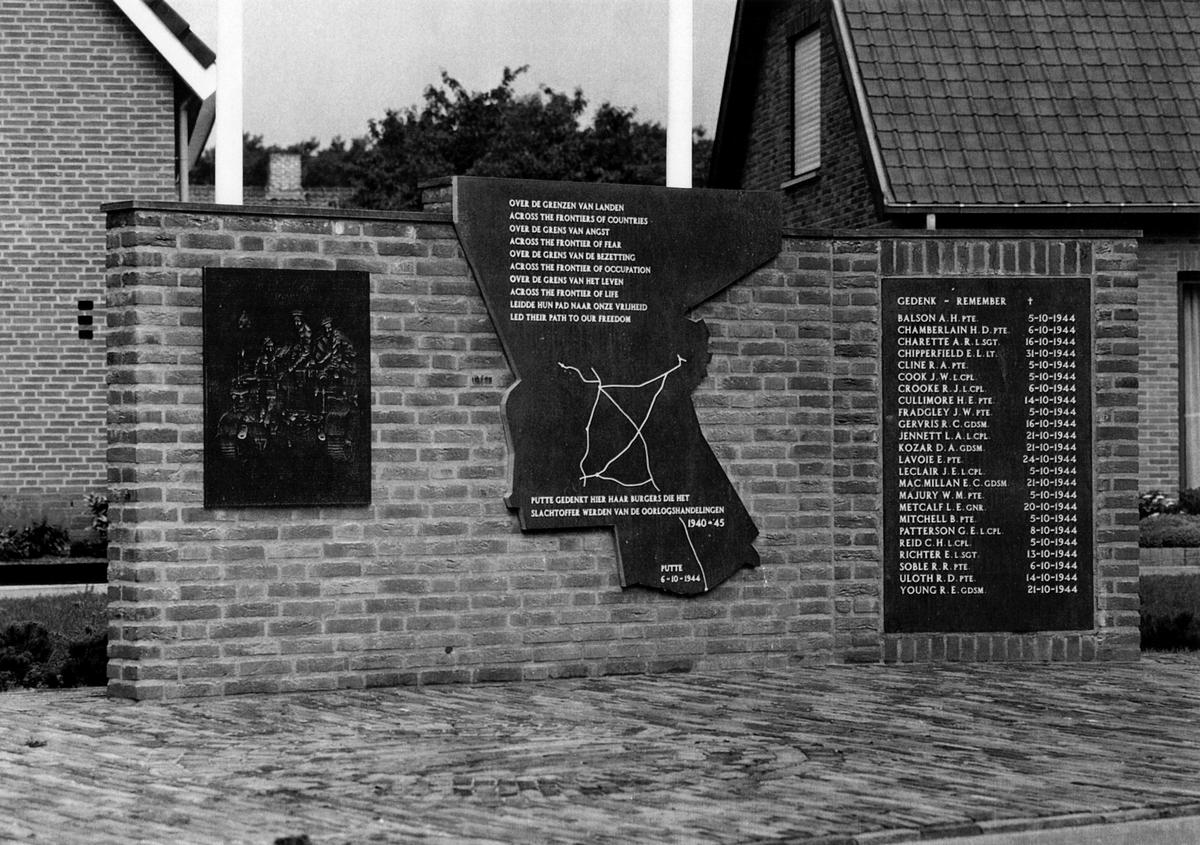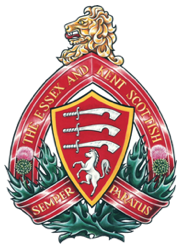Reverend Captain Joseph Cardy, MC, CD, DD

Portrait in black and gray of Reverend Captain Cardy. Taken approximately between 1968 and 1973.
Reverend Captain Joseph Cardy, MC, CD, DD, was born in Cooksville, Ontario, and attended the University of Toronto’s Graduate School of Theology at Wycliffe College. In 1940, Cardy was ordained by the Most Reverend Derwyn T. Own, Primate of the Anglican Church of Canada, located in St. James Cathedral, Toronto, Ontario. Cardy’s first military appointment was as an Auxiliary Services Supervisor with the Canadian Army.
Cardy’s military service began overseas in 1941. In 1942, at age twenty-five, Cardy was appointed Honorary Captain and transferred to the Canadian Chaplain Service. He served in Great Britain and northwest Europe. During the time, Cardy was considered one of the youngest Chaplains in the Forces.
Cardy was a protestant chaplain with 4th Canadian Infantry Brigade with responsibility for the Essex Scottish Regiment. In the Regiment, he was known as “Padre Joe.” As such he provided counselling to the men while under fire, he helped with medical care and attended to those killed.
On 19 August 1942, Cardy was ordered to the south coast of England to provide care to troops returning form the raid on Dieppe. Cardy recalled that they “worked all night and fed them and gave them dry blankets in exchange for wet clothes and tried to do our best to make them comfortable.”
A notable accomplishment in Cardy’s career was his support in the liberation of the small village of Putte on the border between Belgium and the Netherlands. After the annexation of the Netherlands on 17 May 1940, the Germans occupied Putte. In October 1944, the Essex Scottish into the town as a preliminary phase of the Battle of The Scheldt. After a day-long battle, the Essex Scottish were able to secure and liberate the town of Putte.
During the battle, twelve men of the Essex Scottish were killed. Cardy stated that although these men only knew of the town for a few hours, they died heroically and deserved recognition. One by one, Cardy buried the deceased soldiers in the churchyard. Additionally, Cardy wrote letters of condolence to the soldier’s families and helped to distribute their personal effects back to families in Canada. For his heroic service in aiding the 4th Brigade, especially the Essex Scottish, he was awarded the Military Cross and was Mentioned in Despatches.
In 1947, the mayor of Putte presented a Delft China plate to Canadian Prime Minister Mackenzie King. The plate commemorated the fallen Canadian soldiers who liberated Putte during World War II. The back of the plate features a lion-shaped silver plaque with the inscription: “Eternal memorial for Canadian heroes.” Additionally, the plate was decorated with the names of the men who died at Putte. Historian Andrew Horrall noted that, King was perplexed by the gesture of the gift, “as the plate did bear King’s name and so, unlike with his recent personal honours, his diary entry was an unemotional account.” However, Cardy understood the importance of the gift as an intimate tribute to his comrades. In December 1947, knowing the significance of the plate, Cardy sent a letter to Prime Minister Mackenzie King through the Army Headquarters asking him “to write directly to the family of each solider named on the plate.” King agreed and on 16 January 1948, King wrote to the families of the deceased soldiers and thanked them for the sacrifice their family members made while in Putte. Cardy placed the letters provided by King in each man’s service file.
Cardy’s military career with the Canadian Army did not end after the Second World War. From 1946 until April 1951, he served as a Chaplain in Central and Eastern Army Commands. In February 1952, Cardy was appointed as a Major and Senior Chaplain to accompany the 25th Canadian Infantry Brigade to Korea.
Furthermore, in October 1959, Cardy became the Senior Chaplain for the 4th Canadian Brigade Group in Soest, Germany. In 1961, he was promoted to Lieutenant-Colonel as Chaplain, Western Command with headquarters in Edmonton, Alberta. In 1967, Cardy was promoted to Colonel and named Director of Chaplain Personnel. In the following year, he became Brigadier General with appointment as Chaplain General for the Canadian Forces. Cardy remained with the Canadian Army until 1973.
In July 1961, “Padre Joe” was appointed an Honorary Canon by the Anglican Bishop Ordinary to the Canadian Forces. In 1969, he was also appointed as the Archdeacon to the Forces. In April 1968, Cardy was awarded the honorary degree of Doctor of Divinity (DD) by Wycliffe College for his contributions to the Church through his ministry to the Armed Forces and their families.
Through his fruitful career and his devotion to serve others, Cardy earned the respect of every individual he had contact. In retirement, Cardy lived in Victoria, British Columbia with his wife and family. On 2 August 2002, Cardy passed away at the age of eighty-seven.
Story By Taylor Blackmere, Canada Summer Jobs 2022 participant
with The Essex and Kent Scottish Regiment Association
Sources
- An “Eternal Memorial for Canadian Heroes”: The Dutch Town of Putte Commemorates The Essex Scottish Regiment. By: Andrew Horral, 2011
- Duty Nobly Done: The Official History of The Essex and Kent Scottish Regiment by Sandy Antal and Kevin R. Shackleton, 2006
- The Padre. By G.T. (Greg) Childs, CD. (Retired) Regimental Major of The Essex and Kent Scottish
- The Essex and Kent Scottish Regiment Association artifact collection
- Obituary Condolences: Joseph Cardy, Windsor Star, 2 August 2002.

Monument constructed in Putte in honour of the Essex Scottish who sacrificed their lives while liberating the town.
